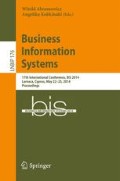Abstract
This paper describes the highly scalable open source framework DrugFusion developed within the European Union(EU) project TIMBUS. It was designed by using Case-Based Reasoning(CBR) methodology to provide intelligent assistance for doctors and pharmacists in drug prescription process. DrugFusion analyses adverse event reports (AER)s published by United States Food and Drug Administration (FDA) and generates knowledge containers, which are used for efficient and accurate retrieval of similar treatment cases curried out in the past. DrugFusion uses the adaptation knowledge to produce a set of recommendations for medical practitioners, which allows them to make the most competent decision in planning a patient treatment. These recommendations include the most appropriate set of treatment drugs and warnings for the most likely adverse events. Considering the high complexity of the developed architecture, the main focus of this paper is on covering the similarity and indexing knowledge, used by the DrugFusion retrieval process.
Access this chapter
Tax calculation will be finalised at checkout
Purchases are for personal use only
Preview
Unable to display preview. Download preview PDF.
References
Ferner, R.E., McDowell, S.E.: Internet accounts of serious adverse drug reactions a study of experiences of stevens-johnson syndrome and toxic epidermal necrolysis. Can. J. Clin. Pharmacol. 8(2), 84–88 (2012)
Butt, T.F., Cox, A.R., Oyebode, J., Ferner, R.E.: Internet accounts of serious adverse drug reactions a study of experiences of stevens-johnson syndrome and toxic epidermal necrolysis. Drug Safety 35(12), 1159–1170 (2012)
Jin, H., Chen, J., He, H., Kelman, C., McAullay, D., O’Keefe, C.M.: Signaling potential adverse drug reactions from administrative health databases. IEEE Trans. Knowl. Data Eng. 22(6), 839–853 (2010)
Jin, H., Chen, J., He, H., Graham, W.J., Kelman, C., O’Keefe, C.M.: Mining unexpected temporal associations: Applications in detecting adverse drug reactions. IEEE Transactions on Information Technology in Biomedicine 12(4), 488–500 (2008)
Krska, J., Cox, A.R.: Adverse drug reactions. in: Clinical pharmacy and therapeutics. Clinical Pharmacology and Therapeutics 91, 467–474 (2012)
Kuan, J.K.P., Paul Fast, H.L.: k-nearest neighbour search for r-tree family. In: Proceedings on First International Conf. on Information, Communications, and Signal Processing, Singapore, pp. 924–928 (September 1997)
Galushka, M., Patterson, D.W., Nugent, C.: Assessment of four modifications of a novel indexing technique for case-based reasoning. Int. J. Intell. Syst. 22(4), 353–383 (2007)
Patterson, D.W., Rooney, N., Galushka, M.: Efficient similarity determination and case construction techniques for case-based reasoning. In: Craw, S., Preece, A.D. (eds.) ECCBR 2002. LNCS (LNAI), vol. 2416, pp. 292–305. Springer, Heidelberg (2002)
Schank, R.: Dynamic Memory: A Theory of Reminding and Learning in Computers and People. Cambridge University Press, New York (1983)
White, T.: Hadoop: The Definitive Guide. O’Reilly Media (2009)
Koutkias, V., Kilintzis, V., Stalidis, G., Lazou, K., Niès, J., Durand-Texte, L., McNair, P., Beuscart, R., Maglaveras, N.: Probability analysis on associations of adverse drug events with drug-drug interactions. BIBE 45(3), 1308–1312 (2007)
Koutkias, V., Kilintzis, V., Stalidis, G., Lazou, K., Niès, J., Durand-Texte, L., McNair, P., Beuscart, R., Maglaveras, N.: Knowledge engineering for adverse drug event prevention: On the design and development of a uniform, contextualized and sustainable knowledge-based framework. Journal of Biomedical Informatics 45(3), 495–506 (2012)
Ji, Y., Ying, H., Dews, P., Mansour, A., Tran, J., Miller, R.E., Massanari, R.M.: A potential causal association mining algorithm for screening adverse drug reactions in postmarketing surveillance. IEEE Transactions on Information Technology in Biomedicine 15(3), 428–437 (2011)
Author information
Authors and Affiliations
Editor information
Editors and Affiliations
Rights and permissions
Copyright information
© 2014 Springer International Publishing Switzerland
About this paper
Cite this paper
Galushka, M., Gilani, W. (2014). DrugFusion - Retrieval Knowledge Management for Prediction of Adverse Drug Events. In: Abramowicz, W., Kokkinaki, A. (eds) Business Information Systems. BIS 2014. Lecture Notes in Business Information Processing, vol 176. Springer, Cham. https://doi.org/10.1007/978-3-319-06695-0_2
Download citation
DOI: https://doi.org/10.1007/978-3-319-06695-0_2
Publisher Name: Springer, Cham
Print ISBN: 978-3-319-06694-3
Online ISBN: 978-3-319-06695-0
eBook Packages: Computer ScienceComputer Science (R0)

